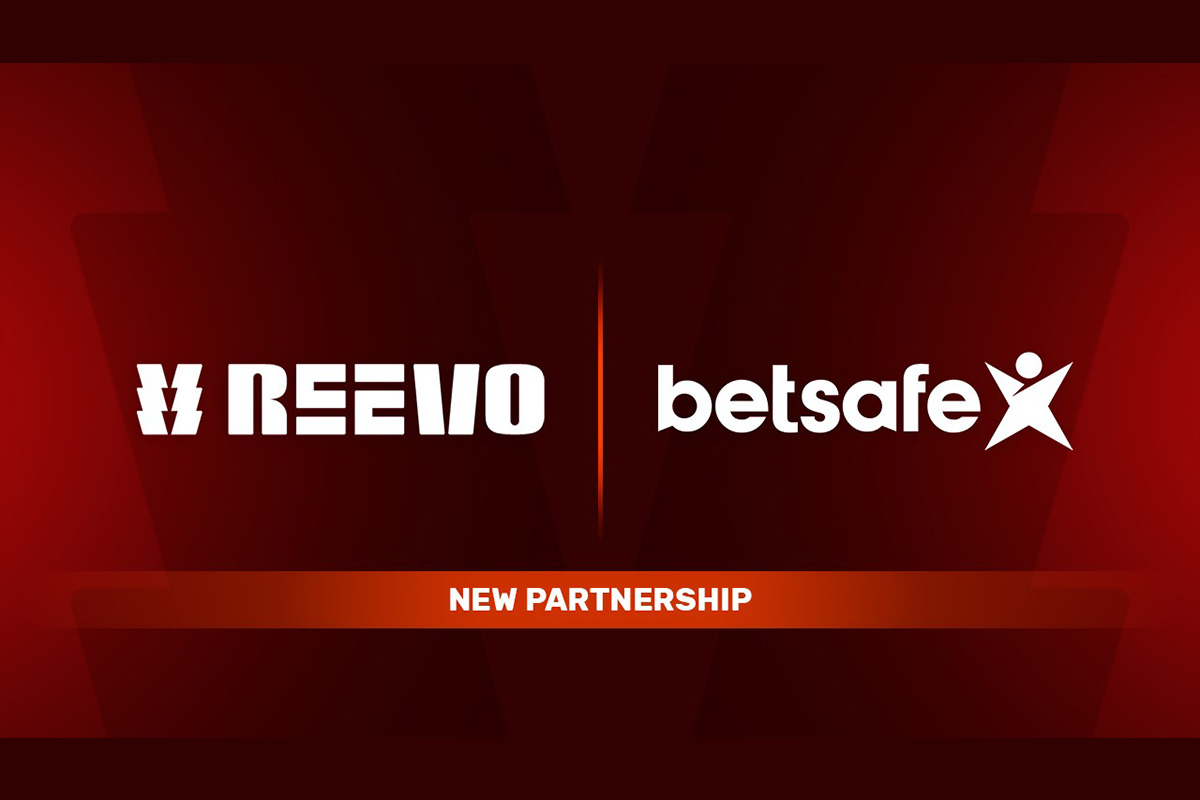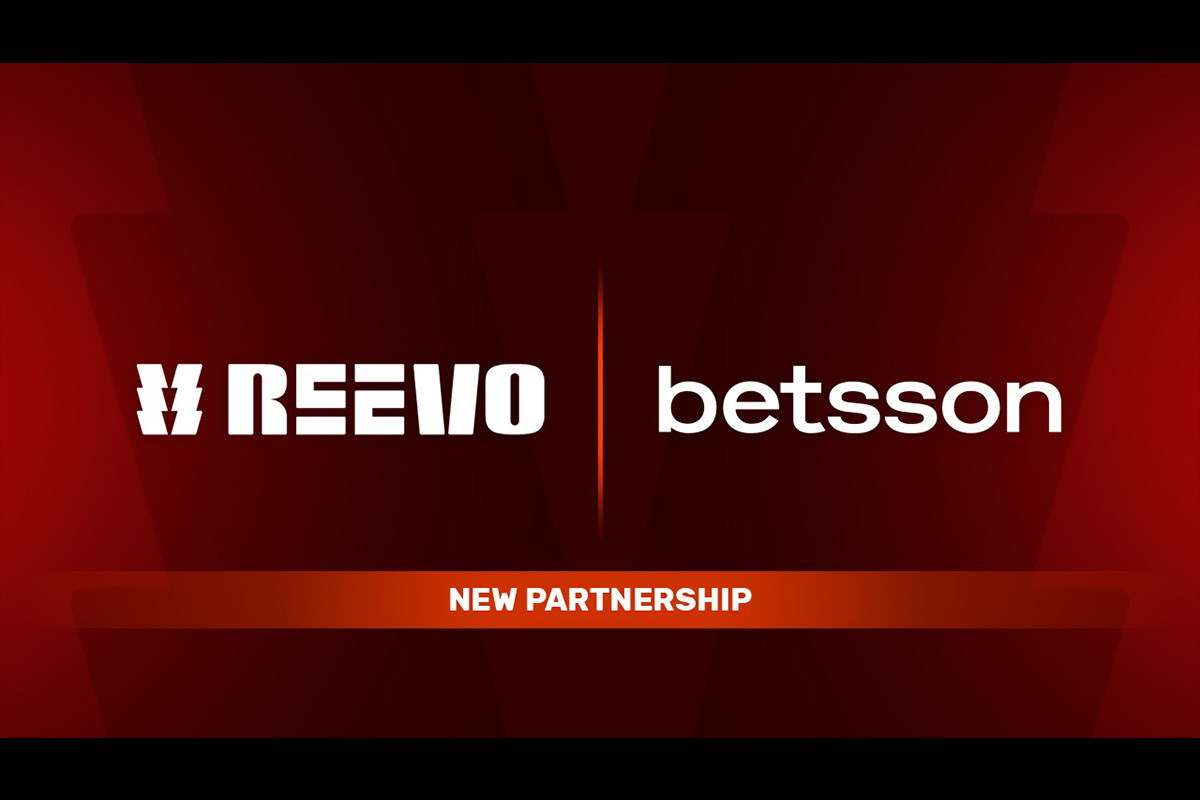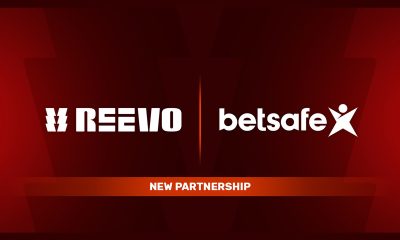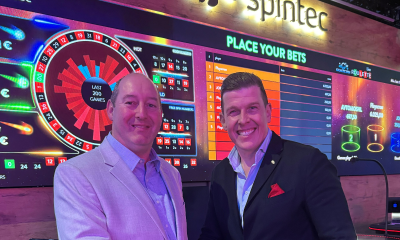Baltics
Modern Oracles & Smart Payments: Finrax’s Vision for Blockchain, AI & Beyond

Finrax steps into the spotlight as the official Lanyards Sponsor at HIPTHER’s MARE BALTICUM Gaming & TECH Summit 2025 in Vilnius, bringing with them a next-gen crypto payment gateway and a bold vision that extends far beyond payments.
We sat down with Konstantinas Balakinas, CEO of Finrax, to discuss the future of AI in finance, the real-world potential of blockchain beyond the buzzwords, and how Finrax plans to bridge fintech innovation with eCommerce and beyond.
Konstantinas, thank you for joining us! Can you please introduce yourself to our readers, and share more about your professional background and role in Finrax?
Thank you — it’s a pleasure to be part of this conversation, especially as Finrax steps into a more visible role at this year’s summit.
I’ve been working in the financial industry since 1999, mostly in regulated environments. The bulk of my career has been in consumer finance, where I had the chance to grow several companies from the ground up and eventually guide one through the process of securing a specialized bank license. That experience taught me a lot about how to build resilient financial infrastructure — and how to adapt when the rules, tools, and expectations shift.
My interest in AI came later. I had a first-hand look at its practical impact while working with a Lithuanian EMI that was really leaning into AI-driven operations. That sparked something — and eventually led me to study AI for Business Analytics at Turing College, where I’m currently sharpening both technical and strategic understanding of how AI can reshape financial services.
At Finrax, I serve as CEO and Chair of the Management Board in its Lithuanian entity. Our mission goes beyond crypto payments — we’re focused on building real utility for digital assets in a way that businesses can trust and adopt without friction.
How do you see today’s AI solutions? Can they be truly predictive, like “modern oracles”, or are we still in the realm of reactive technology?
AI today is generative AI — especially large language models (LLMs), which have made impressive progress in producing human-like text and anticipating user intent. So in a technical sense, yes — these systems are predictive, but not in the way many assume. What they predict is not the future itself, but the next statistically likely word or phrase based on patterns learned from massive datasets. That creates the appearance of intelligence, but not true comprehension.
This distinction is essential. As Carl Bergstrom and Jevin West explain in The Bullshit Machines, LLMs can sound coherent and authoritative while having no actual grasp of truth. They generate content that feels convincing, regardless of whether it’s accurate or logically sound. That’s not a flaw — it’s how they’re designed.
One should approach these tools with both optimism and caution. Today’s AI still sits within the boundaries of Artificial Narrow Intelligence — excellent at specific tasks like pattern recognition, anomaly detection, and content generation, but still a long way from Artificial General Intelligence, which would reason and adapt like a human across any domain. And Artificial Superintelligence, capable of recursive self-improvement and independent thought, remains firmly theoretical.
So, while we admire the capabilities of today’s generative AI, we don’t mistake fluency for understanding. These are powerful tools — but not oracles. The real challenge is using them responsibly and building systems around them that make sense in the real world.
What are some practical ways AI is and could be integrated into Finrax’s crypto payment platform? Are there use cases you’re already exploring or see as promising?
I see three core domains where AI tools offer real practical value — not just for Finrax, but for any fintech building towards efficiency, scale, and regulatory clarity.
The first is internal productivity. AI works well as a personal assistant for employees — helping with everything from drafting emails to summarizing documents or generating code. Off-the-shelf tools like ChatGPT are already useful for this, but their impact depends heavily on how well people know how to prompt them. That’s why custom GPTs are especially promising: they allow us to build tailored assistants with topic-specific knowledge and clear task guidance. For instance, an onboarding specialist might use one to walk through a compliant KYC checklist, while a developer could use another to generate smart contract boilerplate or debug Python scripts.
The second domain is AI agents — and this space is moving fast. These systems handle automated, rule-based workflows, often collaborating with other agents to move tasks along. They’re more constrained than LLMs, but more reliable when used within predefined rules. For a crypto payment platform like ours, agents could eventually assist in payment routing, compliance alerts, or even technical monitoring — anything repetitive that benefits from low-latency automation.
The third area is pattern recognition, where AI’s value is most proven. We see strong potential in using it to support fraud detection and ML/TF screening — not to replace human oversight, but to enhance it. Spotting unusual activity, flagging anomalies, or refining transaction scoring — these are all areas where AI can quietly but meaningfully improve risk management.
That said, we’re also realistic about the limits. With the EU AI Act now on the horizon, every integration has to pass the test of explainability, compliance, and accountability. Any system we deploy will need a clear inventory, GDPR alignment, risk assessment, and, in some cases, staff training. We’re already looking into how these rules will apply — especially as we explore the potential of agent-based systems.
So yes, we’re enthusiastic — but we’re moving deliberately. We’re not building AI from scratch, but we are actively exploring how to apply it in meaningful ways — both internally and within our services. Our business development team is already using tools like ChatGPT in their day-to-day work, and we see real gains in productivity and clarity. That’s the direction we’re leaning into: using AI where it helps people do their jobs better, not just to check a box.
Finrax has built a strong reputation for reliability and speed – processing crypto payments in under a minute. What differentiates your platform from other solutions currently available on the market?
Reliability is the real star here. Speed is expected in blockchain-based systems — but combining that speed with stability, predictability, and regulatory clarity is a much harder problem to solve. That’s exactly where Finrax delivers.
We’ve built a platform that doesn’t just move fast — it does so in a way businesses can actually depend on. We offer fixed-rate settlements to remove volatility, giving partners certainty about what they’ll receive. That’s especially important in high-volume environments, where financial precision matters just as much as transaction speed.
Compliance is also baked in. Every transaction goes through full AML/CTF screening, and our onboarding and monitoring standards are designed to meet the expectations of regulated businesses. That’s not a side feature — it’s part of our foundation.
And while many of our clients have international operations, we’re careful to operate only where we’re permitted to do so. With MiCA coming into force, we’re preparing to scale responsibly, aligned with the new rulebook.
So yes, we’re fast — but more importantly, we’re reliable. And in this space, that’s what truly sets us apart.
What opportunities do you see in the field of eCommerce for a crypto-first payment provider, and what role could Finrax play in shaping the future of online payments?
Crypto is here to stay — and with that in mind, we’re building the tools to help eCommerce businesses accept crypto as naturally as they would any traditional payment method. Our goal at Finrax is to provide plug-and-play solutions that allow online stores across the EU to accept payments in stablecoins or major cryptocurrencies without having to rethink their entire checkout process.
The opportunity goes beyond retail. We see strong potential in industries like logistics, aviation, luxury, and of course, gaming platforms — areas where cross-border payments, speed, and transparency really matter. That said, everything still depends on how quickly users adopt crypto in their day-to-day transactions.
What gives us optimism is the direction regulation is moving. With MiCA coming into effect in the EU, we’re finally getting a clear rulebook — and that’s exactly what’s needed to build trust. Once customers know that only licensed, properly regulated providers can offer these services, it changes the perception. It brings structure to the market — and with structure comes wider adoption.
At Finrax, we’re preparing for that shift. We don’t just want to be ready for the future of payments — we want to help shape it in a way that’s both efficient and trusted.
As the world becomes increasingly automated, how do you see Finrax maintaining a balance between innovation and user-centric service, especially amidst the fast-evolving tech and regulatory landscapes?
Automation, at its core, is about efficiency — but that doesn’t mean we lose sight of the human side. In fact, I’d argue that smart automation should strengthen customer-centricity, not weaken it.
At Finrax, we see automation as a way to free up our people to focus on what actually matters — understanding the client’s real needs, solving problems, and making sure the experience feels consistent and supportive across the board. It also helps us align internal processes more clearly, so that we’re not sending mixed messages to clients. That’s often where customer frustration begins — not with the technology, but with the gaps between systems and people.
Another benefit is the ability to understand customers more precisely. With better data and well-designed workflows, we can respond faster and more accurately, without adding friction.
But none of this can come at the expense of trust. As regulations like MiCA, GDPR, and the EU AI Act begin shaping the environment, it’s clear that automation must be explainable, compliant, and ethically sound. For us, innovation isn’t just about what’s possible — it’s about what’s responsible. And we see that as a competitive advantage, not a constraint.
You’ll be joining the panel “Beyond the Hype” at MARE BALTICUM, discussing blockchain and AI applications in finance and governance. What are you most looking forward to sharing with the audience – and what do you hope to take away from the conversation?
A lot of the hype around AI comes from not really understanding how it works — and I think it’s important to go back to the basics. Most people still assume these systems “know” things. But in reality, large language models are built by training on massive volumes of data — much of it containing human bias, errors, or even outright misinformation. They don’t reason. They predict. They break down language into tokens and map those tokens across hundreds of abstract dimensions — far beyond how we perceive space — then generate output that mimics meaning, even if it’s not grounded in real understanding. But it’s not grounded in fact unless you make it so.
Even the best models will produce an answer to almost anything — even if that answer is fabricated. That’s why we see hallucinations. Unless you know how to prompt properly and critically assess the output, the result might sound confident while being completely off. This is why I always say: at this stage, AI should be seen as an assistant, not an authority. The human must remain in the loop — and at the top.
That said, the future isn’t bleak — it’s exciting, if we use these tools responsibly. One example that stands out to me is what Stripe recently did. They trained an AI model not on words or code, but on tens of billions of payment transactions. The model learned the “language” of money — identifying how payments behave, how fraud patterns look, and what hidden connections exist between different data points. The result? They went from detecting 59% of sophisticated card testing fraud attempts to 97% — almost overnight. That’s not just a technical win — it’s a complete shift in how we think about structured financial data.
So on this panel, I’m hoping to bring two things to the table: first, a grounded reminder that no model is infallible, and second, a practical optimism. AI has the potential to make finance faster, smarter, and safer — but only if we stay thoughtful about how we design, train, and regulate it. Humans should come first — but we don’t need to fear the future if we build it wisely.
Meet Konstantinas Balakinas and the Finrax team live at the MARE BALTICUM Gaming & TECH Summit 2025 on 27–28 May in Vilnius.
🔗 Register now to learn more about blockchain-powered finance, crypto innovation, and the real tech shaping tomorrow’s payments.
The post Modern Oracles & Smart Payments: Finrax’s Vision for Blockchain, AI & Beyond appeared first on European Gaming Industry News.
Aurimas Šilys
REEVO Announces Partnership with Betsafe

REEVO has announced a new partnership with Betsafe, strengthening REEVO’s growing presence across regulated European markets and reinforcing its expansion strategy in the Baltics region.
Through this collaboration, REEVO’s aggregation platform will support Betsafe’s casino offering in Estonia and Latvia, enabling access to a wide range of premium third-party content through a streamlined integration. The partnership reflects REEVO’s continued commitment to providing operators with scalable technology and an efficient route to expanding their game portfolio.
Betsafe is part of the Betsson Group, a global online gambling company operating more than 20 gaming brands across multiple markets. In the Baltics, Betsson Group operates under the Betsafe brand in Estonia and Latvia, offering a trusted and dynamic entertainment experience.
This partnership marks another important step forward for REEVO as it continues to grow as an aggregator and strengthen its reputation as a trusted partner for leading operators in key regulated territories.
Karl Grech, Head of Business Development at REEVO, said: “Estonia and Latvia are exciting markets with strong growth potential, and partnering with Betsafe is a fantastic milestone for REEVO. Betsafe is a well-established and trusted brand in the Baltics, and we’re proud to support their expansion through REEVO’s aggregation platform. This collaboration is another clear step forward in our growth strategy and reinforces our commitment to delivering efficient, high-performance solutions that help operators enhance their casino offering.”
Aurimas Šilys, Managing Director Baltics at Betsson Group, said: “Our collaboration with REEVO opens so many doors for Betsson Group brands in Baltics to onboard and launch more game providers and have the biggest and widest casino selection in Baltics markets.”
The post REEVO Announces Partnership with Betsafe appeared first on Eastern European Gaming | Global iGaming & Tech Intelligence Hub.
Acquisitions/Merger
Boonuspart Acquires Kasiino-boonus to Strengthen its Position in the Estonian iGaming Market

Boonuspart.ee, a leading Estonian portal focused on casino bonuses and online casino comparisons, has acquired Kasiino-boonus.ee, further consolidating its position in the Estonian iGaming affiliate market.
The acquisition brings together two well-established Estonian-language casino resources to enhance content depth, accuracy of comparisons and overall user experience for players seeking up-to-date casino bonuses and reliable information.
Kasiino-boonus.ee has built strong visibility around casino bonus-related search terms in Estonia, while Boonuspart.ee has focused on broader comparisons, editorial content and long-form guides. By combining these strengths, Boonuspart.ee aims to create a more comprehensive and authoritative platform for Estonian players.
“This acquisition supports our long-term strategy of building the most trusted and informative casino bonus resource in Estonia. Kasiino-boonus.ee has a strong legacy in the local market, and we see clear synergies in terms of content, SEO, and player value,” Teemu Pesonen, co-founder of Boonuspart, said.
Following the acquisition, Kasiino-boonus.ee will be gradually integrated into the Boonuspart.ee ecosystem. Existing content will be reviewed, updated and expanded where relevant, with a continued focus on transparency, up-to-date bonus terms and compliance with Estonian regulations.
No changes will be made to player data handling, and no user information is transferred as part of the transaction.
The acquisition reflects a broader trend of consolidation within the European iGaming affiliate sector, as established publishers invest in trusted local brands to strengthen editorial quality and long-term sustainability.
The post Boonuspart Acquires Kasiino-boonus to Strengthen its Position in the Estonian iGaming Market appeared first on Eastern European Gaming | Global iGaming & Tech Intelligence Hub.
Aurimas Šilys
REEVO Partners with Betsson Lithuania

REEVO has announced a new partnership with Betsson Lithuania, strengthening REEVO’s growing footprint across Europe’s regulated markets and marking an exciting step in the company’s expansion into the Baltics.
Through this collaboration, REEVO will provide its aggregation solution to Betsson Lithuania, enabling the operator to expand its casino offering with access to a wide selection of high-quality third-party content through a single integration. This partnership reinforces REEVO’s mission to simplify content delivery and empower leading operators with an efficient and scalable aggregation ecosystem.
Betsson AB is a global online gambling company operating more than 20 online gaming brands and offering casino, poker, bingo, sportsbook and scratch card products. In Lithuania, Betsson operates under its flagship Betsson brand, delivering a trusted digital entertainment experience to the local market.
For REEVO, this partnership represents another important milestone as the company continues to secure strategic collaborations with top-tier operators across key European territories.
Karl Grech, Head of Business Development at REEVO, said: “Lithuania is an exciting market with huge growth potential, and partnering with Betsson is a strong move forward for REEVO. Betsson is a respected name in the industry with a strong presence in the Baltics, and we’re proud to support their platform through our aggregation solution. This collaboration reflects our continued focus on expanding in regulated markets and delivering a content ecosystem that helps operators strengthen their offering and drive long-term engagement.”
Aurimas Šilys, Managing Director Baltics at Betsson Group, added: “Our collaboration with REEVO opens so many doors for Betsson Group brands in Baltics to onboard and launch more game providers and have the biggest and widest casino selection in Baltics markets.”
By launching with Betsson in Lithuania, REEVO continues to build momentum in the region and further expand its international distribution network, offering operators the flexibility and efficiency required to scale quickly in competitive regulated markets.
The post REEVO Partners with Betsson Lithuania appeared first on Eastern European Gaming | Global iGaming & Tech Intelligence Hub.
-

 Aphrodite’s Kiss5 days ago
Aphrodite’s Kiss5 days agoLove on the Reels: Slotland Introduces “Aphrodite’s Kiss”
-

 Amusnet5 days ago
Amusnet5 days agoWeek 7/2026 slot games releases
-

 Denmark6 days ago
Denmark6 days agoRoyalCasino Partners with ScatterKings for Company’s Danish Launch
-

 Baltics6 days ago
Baltics6 days agoEstonia to Reinstate 5.5% Online Gambling Tax From March 1
-

 Booming Games6 days ago
Booming Games6 days agoTreasure Hunt Revival — Booming Games Launches Gold Gold Gold Hold and Win
-

 Brino Games5 days ago
Brino Games5 days agoQTech Games integrates more creative content from Brino Games
-

 ELA Games6 days ago
ELA Games6 days agoELA Games Unveils Tea Party of Fortune — A Magical Multiplier Experience
-

 Bet Rite6 days ago
Bet Rite6 days agoSpintec Expands into Canada with Bet Rite





























